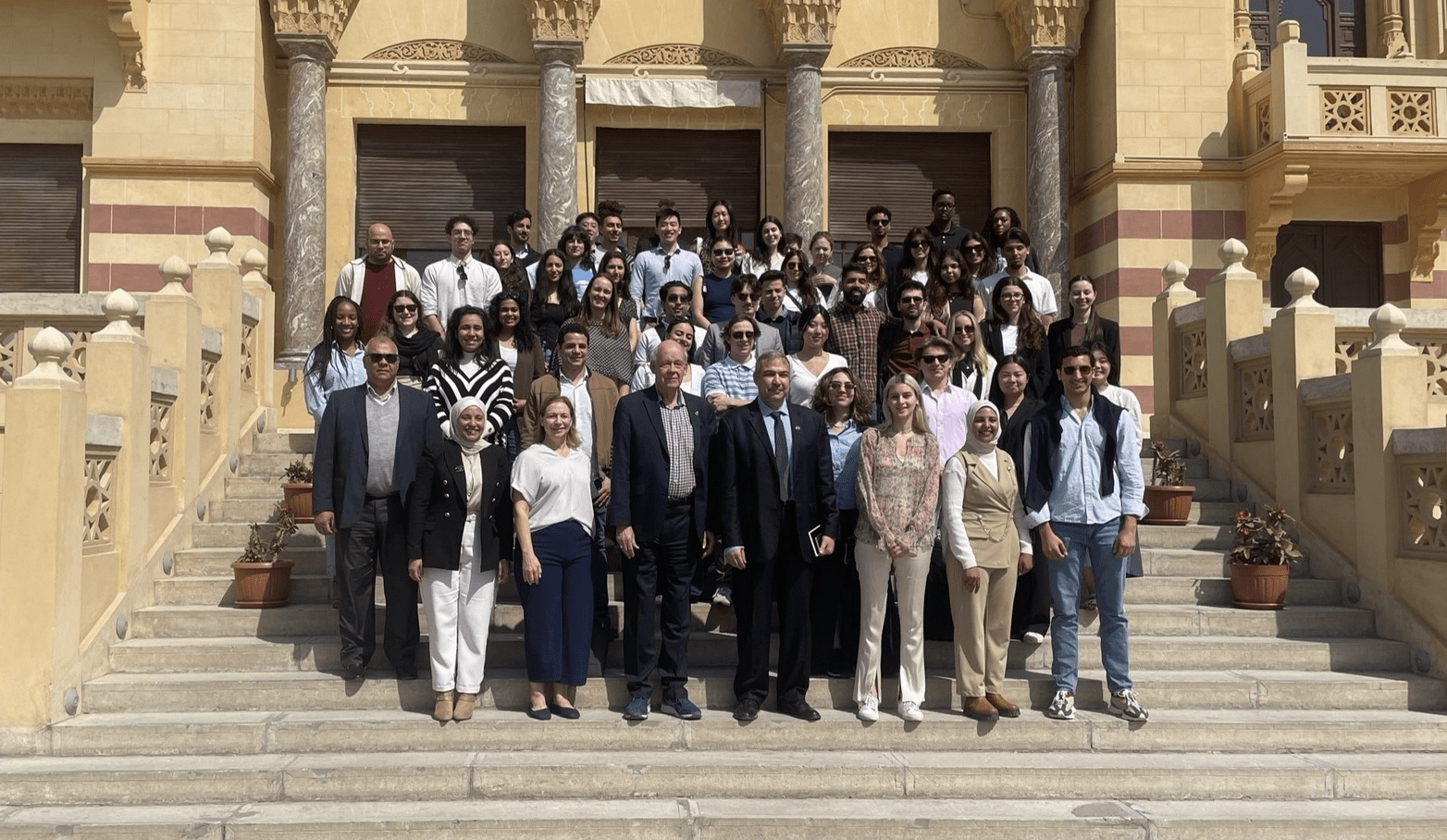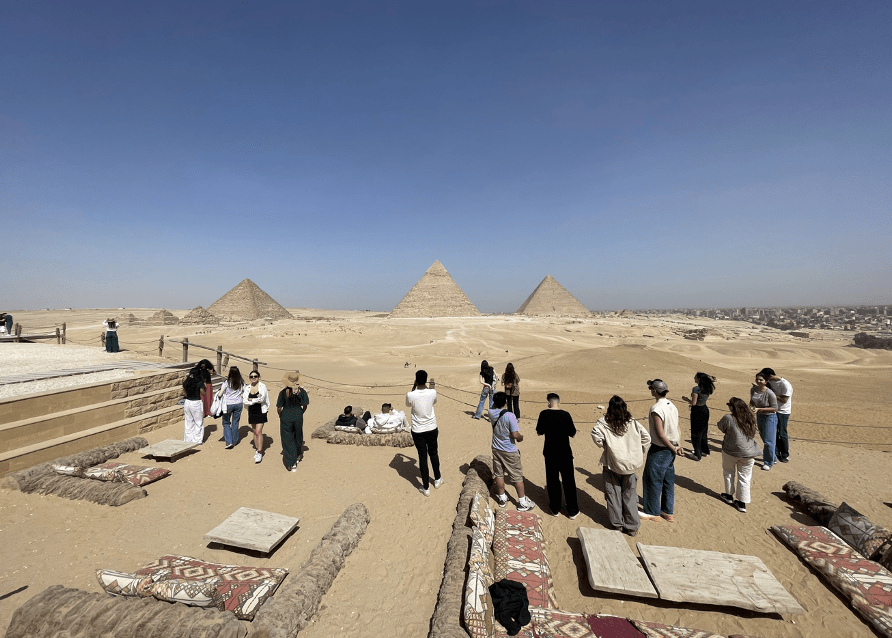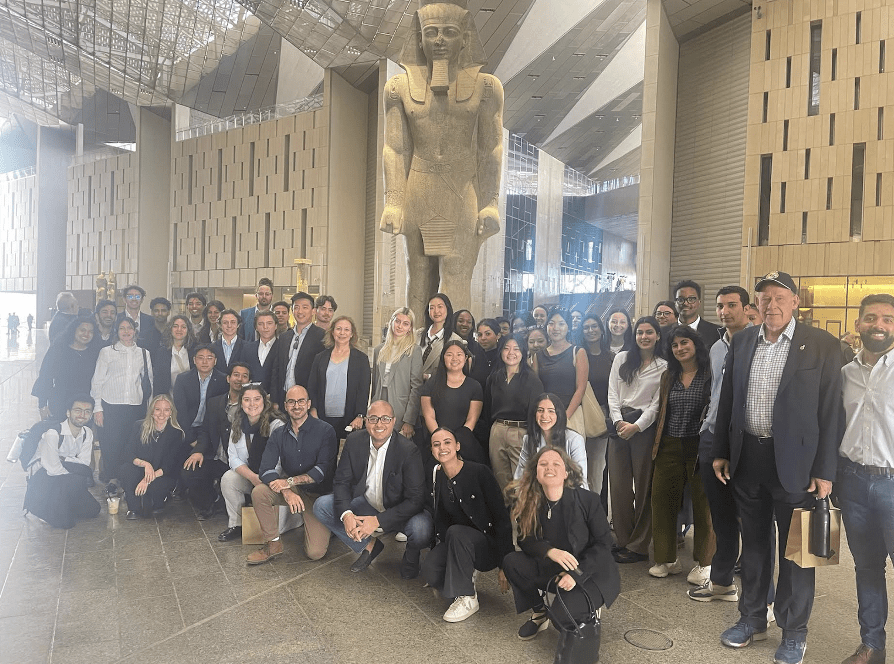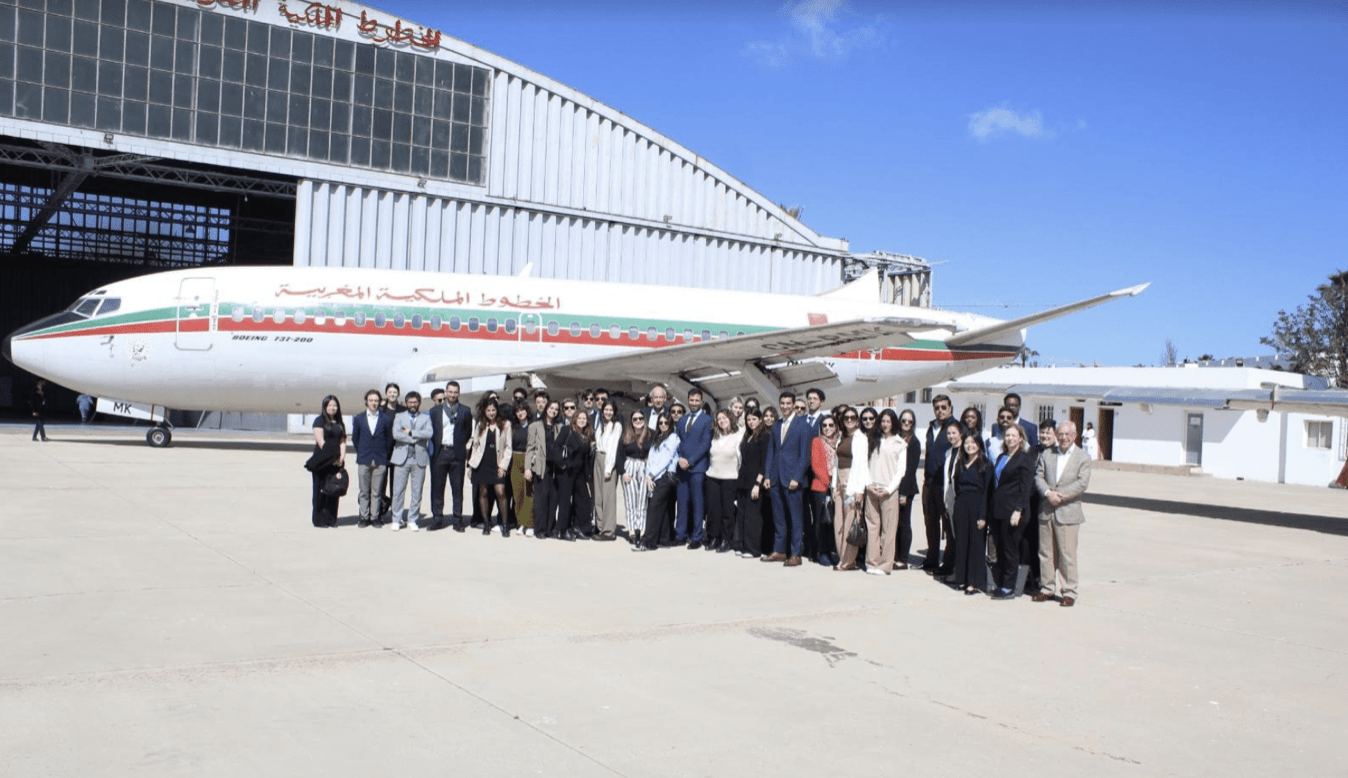Future, Meet the Future: McGill Students in Egypt and Morocco
 McGill students on the Hot Cities of the World tour, Visiting the Plug and Play incubator at Sultana Malak Palace in Cairo/Courtesy McGill
McGill students on the Hot Cities of the World tour, Visiting the Plug and Play incubator at Sultana Malak Palace in Cairo/Courtesy McGill
By Victoria Macheroub
April 2, 2024
The saying “Today’s students are the leaders of tomorrow” is more than an empty cliché. But just as a scientific theory is just a theory before being tested in a lab, our future leaders’ education is not complete until they get out of the classroom and test what they’ve learned in the real world.
This is precisely the aim of McGill’s Annual Hot Cities of the World Tour, initiated in 2009 by Desautels Faculty of Management professor Karl Moore. This year, the trip was co-led by Professor Moore and Desautels Vice Dean Geneviève Bassellier, who oversees the school’s programs abroad. They worked with student-organizers Kenza Addou and Ismael Sefiane, responsible for the Moroccan leg of the trip, Victoria Macheroub and Abdelrahman Sherif, responsible for the Egyptian leg, and Hawa Mariam Keita, responsible of communications between the committee and the selected participants.
The program’s slogan, “Bringing the future to the future” aims to bridge the gap between theory and grounded learning experiences by bringing students into direct contact with government, private sector and civil society leaders in countries with an increasing role in the global economic scene.
The program was launched in 2009 when 40 business students from McGill and Western University, supported by Gerry Schwartz of Onex Corporation and his wife, Indigo Books CEO Heather Reisman, ventured to Tel Aviv and Jerusalem. The next year, 30 McGill students embarked on a similar journey to Dubai and Abu Dhabi, and the Hot Cities of the World Tour officially was born.
Over the past 15 years, Professor Moore and a vibrant cohort of diverse McGill students, have been to Bangalore, Delhi, Mumbai (India) – Johannesburg, Pretoria, Port Elizabeth & Cape Town (South Africa) - Moscow & St. Petersburg (Russia) - Ulaan Bataar (Mongolia) and Seoul (South Korea) – Doha (Qatar), Jakarta & Bali (Indonesia) and Honk Kong – Bogota & Cartagena (Colombia), and Santiago (Chile) – Manila & Palawan (Philippines) and Hong Kong – Kuala Lumpur & Langkawi (Malaysia), and Singapore – Tokyo, (Japan) and Bangkok & Phuket (Thailand).
After a three-year hiatus due to the COVID pandemic, the Hot Cities tour restarted in 2023. Recognizing the immense growth potential the African continent represents, the group headed to the fast-growing economies of Ghana and Cote d’Ivoire, in West Africa. Amazed by the vibrant culture, warm hospitality, fast-changing landscape, and countless opportunities in both countries, we vowed to come back to further discover this rich continent. Based on input from students and alumni, Professor Moore decided our 2024 destinations would be Egypt and Morocco.
The first destination, Cairo, perfectly illustrated the duality that had brought the group to Egypt: a land with both an incredibly rich cultural heritage, ancient Egypt, and the new vision for Cairo as a technological hub. We witnessed that transformation at the renowned incubator Plug and Play, and a tech village comprised of key players in innovation and technology development, including IBM Egypt and the Egyptian Ministry of Communications and Information Technology.
After the Arab Spring transformed its political system in 2011, first with the promise of democracy, then with a return to authoritarianism under President Abdel Fattah el-Sisi, Egypt drifted further into Beijing’s economic and political orbit. With Chinese investment in Egypt increasing 317% between 2017 and 2022, China is the major investor in Egypt’s newly constructed administrative capital in the desert outside Cairo. In October 2023, Egypt became the first African country to issue a “panda bond” denominated in Chinese yuan two months after joining the China-led BRICs group of countries. In early March, the International Monetary Fund (IMF) doubled its bailout package for Egypt, from $3 billion to $8 billion.
 The Hot Cities World Tour group in Giza/ at the 9 Pyramids Lounge overlooking the Great Pyramid/Courtesy McGill.
The Hot Cities World Tour group in Giza/ at the 9 Pyramids Lounge overlooking the Great Pyramid/Courtesy McGill.
That tension between accelerated modernity and the country’s longstanding economic status quo, and between this century’s competing geopolitical systems, is immediately put in perspective with a trip to Giza. There are no words that can quite describe the epic sweep of time perceived while walking around the Great Pyramids and the Sphynx, and while visiting the countless statues, mummies, and other antiquities we saw in the Land of the Pharaohs.
 Visiting the new Grand Egyptian Museum with Dr. Arto Belekdanian, an Oxford-trained Egyptologist and the brother-in-law of a McGill grad/Courtesy McGill
Visiting the new Grand Egyptian Museum with Dr. Arto Belekdanian, an Oxford-trained Egyptologist and the brother-in-law of a McGill grad/Courtesy McGill
The Grand Egyptian Museum, an architectural and cultural newcomer replacing the old Egyptian Museum on Tahrir Square that starred in so many archaeological adventure films, is the largest museum in the world. Opened in February 2023 after more than a decade of construction, it combines traditional archaeological exhibits with the wonders of VR in its latest Tutankhamun immersive exposition. Only a few minutes away from the Giza Plateau, in the “Smart Village”, Cairo’s fully-connected technological district, an array of professionals work to reshape Egypt as a regional and international power. Meeting with Egyptian Minister of Communications and Information Technology Amr Talaat and his two McGill-educated sons, we heard about the government’s plan to empower the Egyptian economy by harnessing the power of technology. Dining at the Canadian ambassador’s residence with Senior Trade Officer Joseph Tadros and his team gave us a better understanding of the dynamics between the two countries, and of our diplomats’ responsibilities while abroad.
Our second destination was Morocco, the constitutional monarchy ruled by the Alawi dynasty currently represented by King Mohammed VI, as well as by its appointed prime minister, Aziz Akhannouch, CEO of the oil and gas conglomerate Akwa Group. China has also been investing in Morocco, most notably in the $1 billion Mohammed VI Tangier Science and Technology City, which is eventually expected to host around 200 Chinese companies as part of China’s multibillion-dollar Belt and Road Initiative. Morocco is home to 70% of the world’s phosphate, a key ingredient in the lower-range EV batteries produced by Chinese companies, and the fuel for Beijing’s plan to make Morocco a centre for EV production.
 The McGill group on a tour of the Royal Air Maroc headquarters in Casablanca/Courtesy McGill
The McGill group on a tour of the Royal Air Maroc headquarters in Casablanca/Courtesy McGill
Having flown from Montreal to Cairo on Royal Air Maroc, we were welcomed to Casablanca — the city most associated with a classic wartime film which is also the country’s economic capital — with a tour of the RAM headquarters, the company’s design lab, and their private aviation museum. Senior RAM executives shared their vision for the company and for Africa’s future. Their slogan and new campaign “Dream Africa Meet Morocco” are directly derived from the company’s ambition of establishing itself as a global connector among five continents. The next day, roaming around the Tangier Med Port Authority, the largest port in Africa, reinforced our understanding of the country’s aspiration to become a key player in global commerce, strategically located at the crossover of the African, European (13 km across the Strait of Gibraltar), and American (by sea) continents.
In Rabat, the country’s political capital, meeting Ali Seddiki, director-general of the Moroccan Agency for the Development of Investments and Exports (AMDIE), was an education in the country’s local industries, and the relations it maintains with key players in the Western, Arab, and African world. At Université Mohammed VI Polytechnique we discovered an ultra-modern campus, including Ai Movement, the Moroccan centre for artificial intelligence with the ambition of making Morocco a regional AI hub impacting its ecosystem, on strategic, educational, and industrial levels.
Later during the week, the group headed south for a quick visit to the cultural city of Marrakesh and its vibrant souk, where the real business happens, before continuing our journey through the Atlas Mountains to the southern coast of the country. Taghazout, where we spent our last few days, was originally a fishing village but has become the government’s latest project to expand the tourism industry. The coastal municipality just north of Agadir, long known for its surfing, now includes a cluster of newly constructed luxury hotels, the Argan Museum, dedicated to argan oil, a local export, and numerous tourist entertainment options.
 On the beach at Taghazout/Courtesy McGill
On the beach at Taghazout/Courtesy McGill
Finally, as this incredibly rich journey came to an end, students and alumni shared their reflections on what we’d learned along the way.
Some reflected on the value of seeing two emerging economies up close — especially in how both Egypt and Morocco have defined their opportunities for foreign investment in ways that established economies cannot. The collective values and long-term orientation we observed in Morocco and Egypt contrasted starkly with more individualistic and short-term focus often prevalent in North America. This prompted the group to reflect on the importance of cultural context in shaping economic and social landscapes.
The alumni were also given the opportunity to share with the students some of their own professional wisdom and experiences, stemming mature follow-up discussions on the professional world that awaits the young adults. All, students, alumni, and faculty, came out of this trip changed for the better, excited about what the future will bring, and knowledgeable on how to be a relevant actor in it. In the upcoming years, Professor Moore, students, and alumni, hope to travel to East Africa, South-East Asia, and the Middle East, to continue bringing the future to the future.
Victoria Macheroub is a third-year student at McGill University, studying mathematics, economics, and entrepreneurship. She hopes to start her professional career in finance or consulting, with a focus on emerging market economies.
